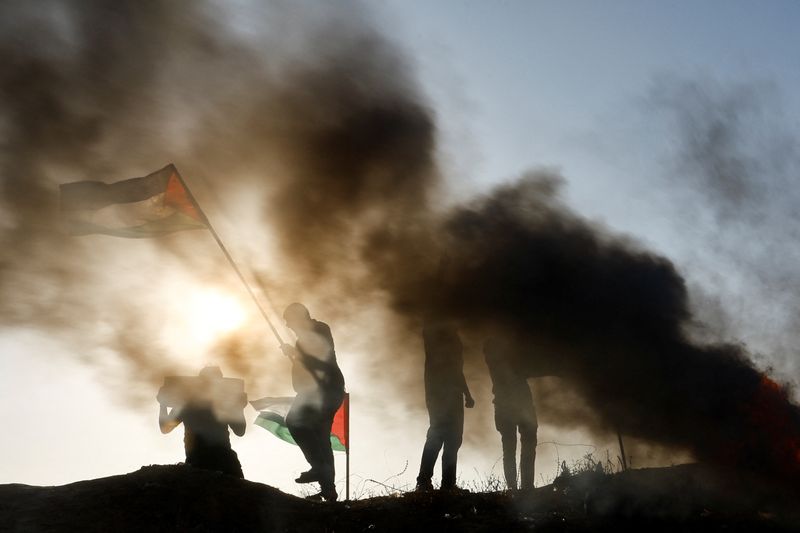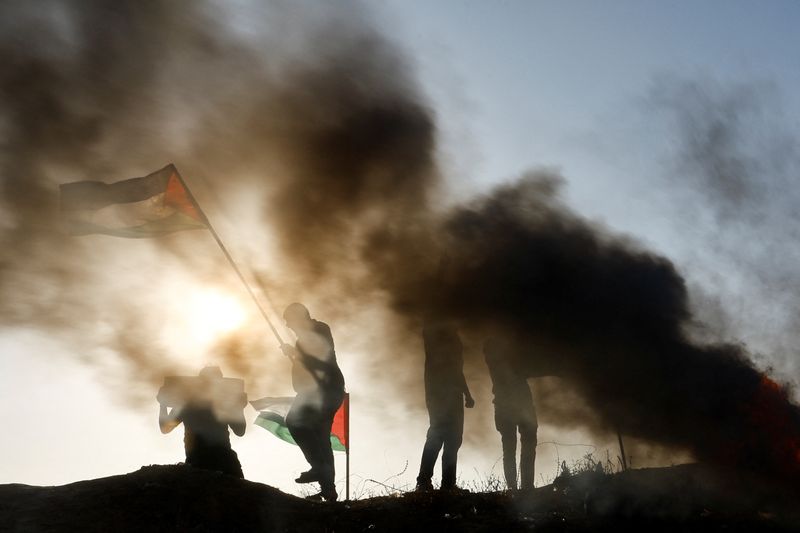Stock Markets
Explainer-Israel’s attack on Jenin: Why now and what for?


© Reuters. Palestinians protest against the Israeli army raid in Jenin, along Israel-Gaza border fence, in Khan Younis, in the southern Gaza Strip, July 4, 2023. REUTERS/Ibraheem Abu Mustafa
(Reuters) -Israel unleashed a major raid on July 3 on Jenin refugee camp, a Palestinian militant stronghold in the Israeli-occupied West Bank, killing at least 10 Palestinians in clashes with gunmen.
Here is what you need to know about Jenin:
WHY IS ISRAEL ATTACKING JENIN?
Since March 2022, Jenin and outlying areas in the north of the Israeli-occupied West Bank have drawn intensified raids ordered by Israel’s nationalist-religious government after a spate of Palestinian street attacks.
The Jenin camp has long been a hotbed of militants with an array of light weapons and a growing arsenal of explosive devices. The Israeli military regularly accuses militant groups of basing fighters within densely populated urban areas such as refugee camps that date back to 1948. Many of the militants live in the camp, often with their families.
In January, Israeli forces killed seven gunmen and two civilians in a raid in Jenin. Last month, militants and Israeli troops waged an hours-long gunbattle in which six Palestinians were killed and over 90 wounded. Seven Israeli personnel were wounded by a landmine that crippled their armoured vehicle.
Palestinian gunmen shot dead four Israelis near a Jewish settlement in retaliation, prompting settlers to rampage through Palestinians towns, torching buildings and cars.
This slide into some of the worst violence since the Palestinians’ 2000-05 Intifada (uprising) comes amid a prolonged absence of peace talks envisaging Palestinian statehood, an increasingly weak Palestinian political leadership and a steady expansion of Jewish settlements on occupied land under Israel’s most hardline nationalist government ever.
WHERE IS JENIN AND WHAT IS LIFE LIKE THERE?
Jenin is a small city in the hilly, far north of the West Bank, near the border with Israel, and contains a teeming, concrete and cinder-block refugee camp by the same name housing some 14,000 people. They are descendants of Palestinians dispossessed when Israel was created in 1948, and most are impoverished and unemployed. This harsh heritage generates die-hard hostility to Israel and support for Palestinian militant groups.
WHAT IS THE SIGNIFICANCE OF JENIN REFUGEE CAMP?
Jenin was the arena of some of the worst bloodshed during the second Intifada, which began after the collapse of U.S.-backed peace talks in 2000 and escalated into an armed conflict between Israel and militant groups.
Jenin produced many of the suicide bombers who spearheaded the uprising and, to curb it, Israeli armoured forces carried out a devastating raid on its camp in April 2002 as part of a wider clampdown on areas where Palestinians had exercised limited self-rule under 1990s interim peace deals.
U.N. reports said 52 Palestinians died in Jenin, as many as half of them civilians, while Israel lost 23 soldiers, with over 400 homes demolished and over a quarter of the population left homeless, necessitating a reconstruction of the camp.
Two decades on, Israel has sounded alarms over the growing number of gunmen in Jenin and their stockpiling of munitions. Israel says the camp is a hub for planning and preparing militant attacks as well as a safe haven for fighters funded by Hamas or the Iranian-backed Islamic Jihad group.
Israel also says more than 50 shooting attacks have been carried out by Jenin-area militants since the beginning of 2023 and that almost half the population is affiliated either with Hamas or Islamic Jihad.
The launch of two improvised rockets by militants near Jenin last month raised alarm in Israel that the West Bank could be going the way of the Gaza Strip, from which it withdrew settlers in 2005 and where armed Islamist factions are now in power.
Recent smaller-scale Israeli raids on Jenin, often employing squads of commandos disguised as Palestinians, have encountered difficulties given militants’ booby-trapping of the narrow lanes with bombs and quick detection of strangers in the camp.
That contributed to the size of the early July Israeli operation – involving over 1,000 soldiers – as well as Israel’s decision to back them up with rare drone strikes – in what it called a drive to destroy militant infrastructure and weapons.
Among sites the Israeli military says it has unearthed in Jenin is a command room with a bank of CCTV cameras covering the camp and a tunnel and armoury hidden underneath a mosque.
Israel also says it has captured 120 suspected militants and killed at least nine gunmen in Jenin. Of the 10 Palestinian fatalities, five have been confirmed as militants.
WHY DO GUNMEN SEEM TO ECLIPSE GOVERNANCE?
Militant groups present in Jenin include the Iran-backed Islamic Jihad; the Islamist Hamas, which controls Gaza; and the armed wing of President Mahmoud Abbas’ Fatah faction. The camp’s militants operate under the umbrella of the Jenin Brigades.
Their growing presence has been partly due to inaction by the security forces of Abbas’s internationally backed Palestinian Authority (PA), which says Israel has undermined its credibility on the street. But their strength also feeds on the weakness of 87-year-old Abbas, whose formula of statehood negotiations with Israel collapsed in 2014, with no revival on the horizon, and perceived endemic incompetence and corruption within the PA.
WHAT IS THE HISTORY OF ISRAELI-PALESTINIAN CONFLICT?
Israel’s founding in 1948, defeating Arab armies from around the Middle East, scattered hundreds of thousands of Palestinian refugees through the wider region in what Palestinians call their Nakba (catastrophe).
In the next major Middle East war 19 years later, Israel captured the West Bank and East Jerusalem from Jordan and Gaza from Egypt. Israel annexed East Jerusalem in a move not recognised internationally, and launched settlements in the West Bank and Gaza.
In the mid-1990s, Israel and the Palestinians reached interim peace accords but a series of follow-up “final status” negotiations on a Palestinian state in the West Bank and Gaza foundered repeatedly on intractable disputes over borders, settlements, refugees and Jerusalem. The last round of U.S.-brokered talks broke down in 2014.
Stock Markets
Suburban Propane director Logan sells $139k in shares
Stock Markets
Stock market today: S&P 500 closes lower, but posts big weekly win
Stock Markets
TD Bank promotes Laura Nitti to retail market president role

 Forex3 years ago
Forex3 years agoForex Today: the dollar is gaining strength amid gloomy sentiment at the start of the Fed’s week

 Forex3 years ago
Forex3 years agoUnbiased review of Pocket Option broker

 Forex3 years ago
Forex3 years agoDollar to pound sterling exchange rate today: Pound plummeted to its lowest since 1985

 Forex3 years ago
Forex3 years agoHow is the Australian dollar doing today?

 Cryptocurrency3 years ago
Cryptocurrency3 years agoWhat happened in the crypto market – current events today

 World3 years ago
World3 years agoWhy are modern video games an art form?

 Commodities3 years ago
Commodities3 years agoCopper continues to fall in price on expectations of lower demand in China

 Economy3 years ago
Economy3 years agoCrude oil tankers double in price due to EU anti-Russian sanctions























